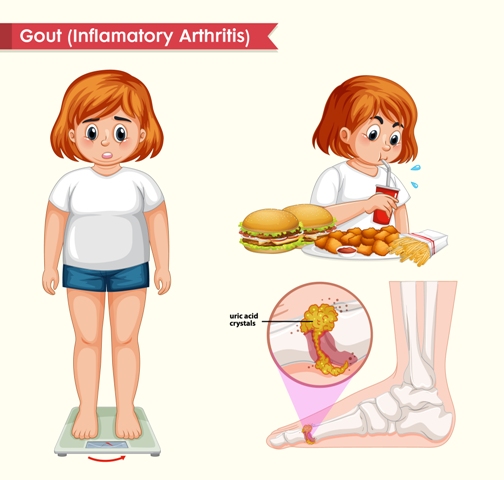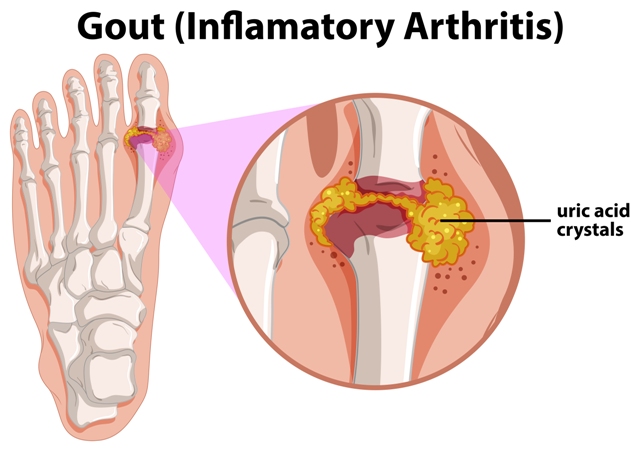Gout is referred as a type of arthritis, which is characterized by tenderness, severe pain in joints as well as redness. It is mainly caused by depositing too much uric acid (a chemical substance, which is produced during the digestion of purine rich food) within the joint.
This article will discuss about 18 imperative ways that help in improving the symptoms of gout –
Better to limit the intake of purine rich food
- It is always better to reduce the purine intake as purine is responsible for producing more uric acid in body thus individual who are already suffer from gout (that means they have high level of uric acid in their body), should switch from purine rich foods to low purine rich foods in order to reduce the synthesis of uric acid, which ultimately improves the symptoms of gout
- Consumption of red meat, organ meat, fatty fish like herring, sardines, cod fish, scallop trout, tuna, should be avoided as they are considered as rich source of purine

Try fenugreek seed
- Consumption of fenugreek is also considered as one of the important ways of preventing gout
- Fenugreek has outstanding anti-inflammatory property that helps in preventing both internal and external inflammation as a result help in preventing gout
- Whereas it is also associated with reducing swelling of joint and the pain, which also helps in minimizing discomfort
- It is better to soak the fenugreek seeds over night and consumption of the extract in the very next morning works like magic

Increase the intake of Vitamin C
- Vitamin C plays important role in reducing uric acid level in body as a result helps in reducing the prevalence of gout
- Whereas it is also associated with decreasing the susceptibility of gout attack thus it is better to include Vitamin C rich foods in diet like guava, amla, lemon, oranges, broccoli, bell peppers, kiwi, tomatoes, papaya etc
Try ginger
- Ginger is considered as one of the most versatile herbs that can be used for various medicinal purposes
- It has potent anti-inflammatory activity, which ultimately helps in improving the symptoms of gout by preventing swelling and pain
- Moreover it is better to include ginger in diet in order to reduce the prevalence of gout attack
Increase magnesium intake

- Magnesium is an important trace element that has been widely used for preventing gout because it helps in decreasing the level of uric acid in body, which ultimately lowers the susceptibility of gout
- It has seen that deficiency of magnesium is closely related with increasing the risk of inflammatory stress in body, which ultimately worsen the condition thus it is better to increase the intake of magnesium in order to improve the symptoms of gout
Have celery seed
Celery seed or its extract has been traditionally used as an imperative remedial action for gout as it helps in preventing inflammation and helps in improving joint health
Often consume nettle tea
Consumption of nettle tea is also very effective for improving the symptoms of gout as it helps in preventing inflammation, whereas it is also very useful for improving renal health and promotes the elimination of uric acid from body
Include Dandelion
It is another important option for preventing gout and it has seen that it is very effective in reducing the level of uric acid among those individual who suffer from renal disorders
Use Epsom salt
- It is better to have a bath with Epsom salt for treating gout attack
-
 Epsom salt is loaded with magnesium, which plays vital role in improving the symptoms of gout as it helps in preventing inflammation
Epsom salt is loaded with magnesium, which plays vital role in improving the symptoms of gout as it helps in preventing inflammation - It is better to mix 1 to 2 cup of Epsom salt in your bath and soaking of the entire body within it especially the affected joints help to provide quick relief from pain
Better to stay hydrated
- It is always better to stay hydrated as it helps in eliminating toxins and waste products from body by promoting urination
- It also helps to support the kidney for eliminating uric acid as a result decreases the uric acid load in body, which subsequently improves the symptoms of gout
- An individual should consume at least 6 to 8 glasses of water in a day

Include garlic
Garlic is another important therapeutic substance that can be consumed for preventing gout as it is also responsible for eliminating excess uric acid from body
Have some carom seed
- Carom seed plays vital role in removing uric acid from body thus helps in reducing the prevalence of gout
- It is better to consume carom seed along with ginger for maximizing its benefits
- Carom seed can be boiled with a cup of water along with ginger slice and consumption of the decoction after straining is really very useful for improving the symptoms of gout

Try coriander
- Consumption of coriander is very effective for preventing gout as it is also associated with reducing the elevated level of uric acid in body
- It is always better to consume adequate water along with coriander for maximizing the benefits as water is also accountable for stabilizing uric acid level in body
Include cherry in diet
Consumption of cherry is also considered as an important preventive measure for gout as it helps in lowering the risk of gout attack
Include turmeric in diet
- Turmeric has been extensively used for various medicinal purposes and consumption of turmeric in case of gout is also very effective
- It has potent anti-inflammatory activity that helps to reduce chronic inflammation as well as pain, which ultimately helps to treat gout
- It basically helps in decreasing the activity of the enzyme Xanthine oxidase, which is responsible for producing uric acid in body
Increase your fibre intake
- Consumption of fibre is very effective for preventing gout
- It has seen that too much level of insulin in body stimulate the production of uric acid thus increases the risk of developing gout thus it is always better to maintain a healthy insulin level and it can be easily achieved by consuming fibre. Fibre plays vital role in stabilizing insulin level
- Whereas fibre is associated with decreasing body fat percentage and facilitates weight reduction too, which is also accountable for improving the symptoms of gout

Maintain a healthy body weight
- Increase in body weight may worsen the condition thus individual especially who suffer from gout should maintain a healthy body weight
- It has seen that fat cell can produce more uric acid than muscle cells thus individual who have comparatively higher amount of fat cells in their body are always at high risk of developing gout
- Whereas excessive body fat percentage may hinder the activity of kidney as a result minimizes the flushing out of uric acid from body hence increases the prevalence of gout by accumulating uric acids in body
- On the other hand over weight may also affect the joints, which also worsen the condition thus it is better to maintain a healthy body weight for improving the symptoms
Better to say no to alcohol
- Alcohol consumption should be strictly avoided as it is correlated with an increase risk of developing gout
- Whereas it is also associated with increasing the risk of gaining weight, which ultimately worsen the condition
Individual suffer from gout can follow the above stated remedies for improving their symptoms in a natural way


Source:
Choi, H.K., Gao, X. and Curhan, G., 2009. Vitamin C intake and the risk of gout in men: a prospective study. Archives of internal medicine, 169(5), pp.502-507.
Harrold, L.R., Mazor, K.M., Peterson, D., Naz, N., Firneno, C. and Yood, R.A., 2012. Patients’ knowledge and beliefs concerning gout and its treatment: a population based study. BMC Musculoskeletal Disorders, 13(1), pp.1-8.
Harrold, L.R., Mazor, K.M., Velten, S., Ockene, I.S. and Yood, R.A., 2010. Patients and providers view gout differently: a qualitative study. Chronic illness, 6(4), pp.263-271.
Mehmood, A., Zhao, L., Wang, C., Nadeem, M., Raza, A., Ali, N. and Shah, A.A., 2019. Management of hyperuricemia through dietary polyphenols as a natural medicament: A comprehensive review. Critical reviews in food science and nutrition, 59(9), pp.1433-1455.
Zhu, Y., Pandya, B.J. and Choi, H.K., 2011. Prevalence of gout and hyperuricemia in the US general population: the National Health and Nutrition Examination Survey 2007–2008. Arthritis & Rheumatism, 63(10), pp.3136-3141.


